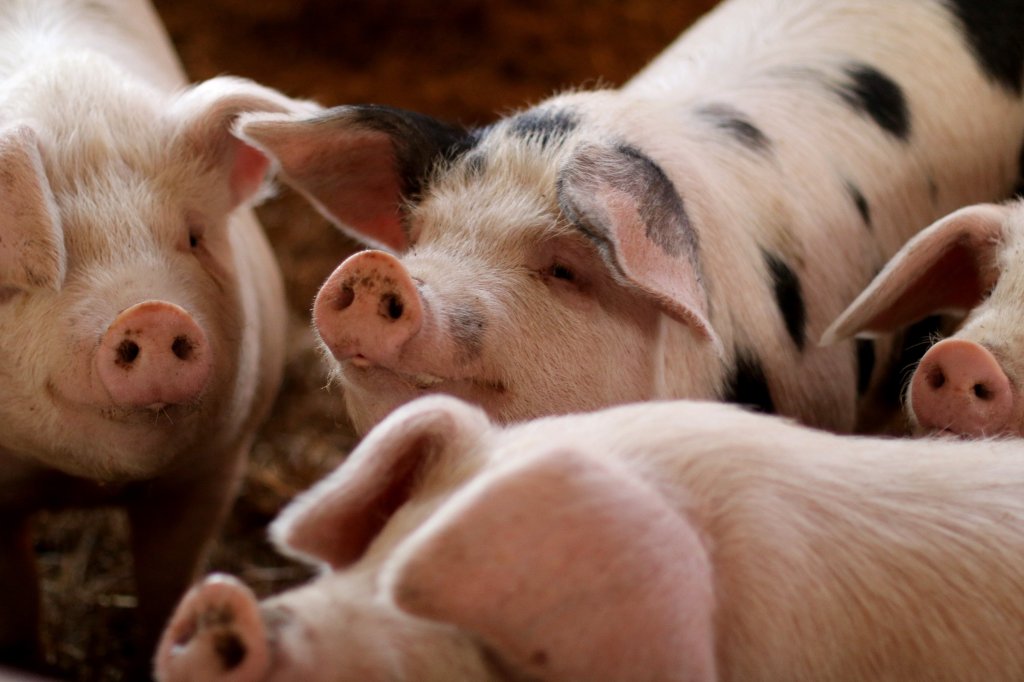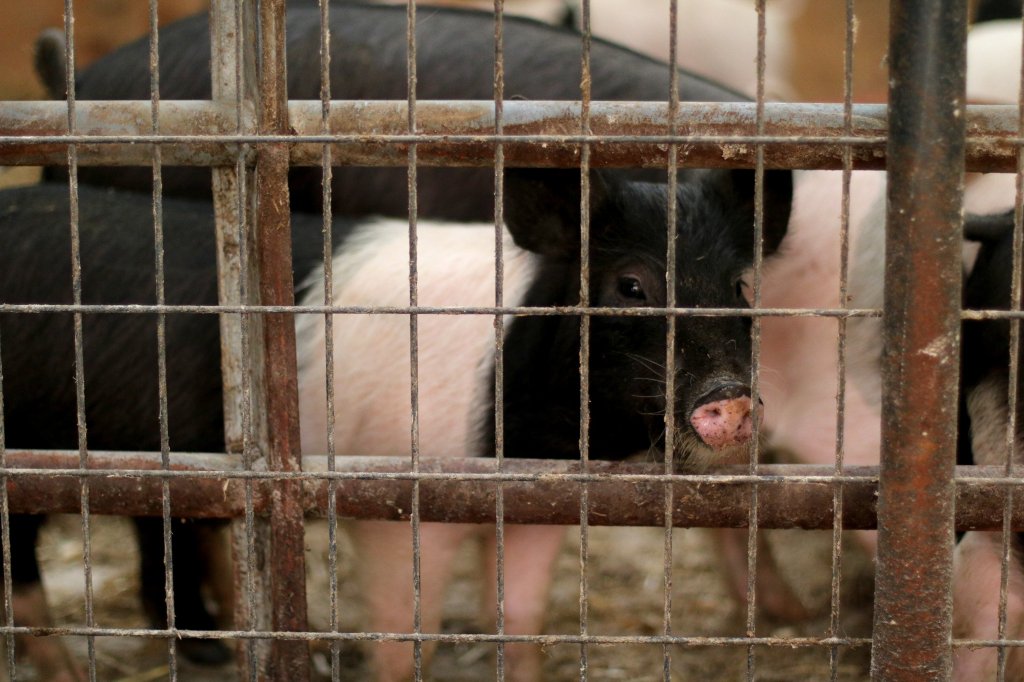PITTSFIELD — For Heather and Doug Donahue, figuring out what to do with the watery byproduct of their cheese production posed a challenge.
The Donahues, who 13 years ago this week bought Balfour Farm in Pittsfield, could compost the whey they produce at their organic dairy farm and creamery. Or they could take the whey (liquid remaining after milk has been curdled and strained) and spread it onto their fields.
A third option – feeding the whey to their pigs, which provide frozen pork and sausage for sale – is opening up a new avenue for income at this off-the-grid farm in Somerset County.
“We’re really ramping up our production of pork,” Heather Donahue said last week. “We can better utilize the whey in a way that it’s creating food.”

Some of the pigs at Balfour Farm in Pittsfield will soon be sent to the butcher. Photographed on Friday, the Pittsfield farm, owned by Heather and Doug Donahue, is among five farms in Maine to have won competitive Value-Added Producer Grant funding from the U.S. Department of Agriculture. Anna Chadwick/Morning Sentinel
About 50 miles away in southern Kennebec County, Sarah, and Matt Perkins have been making plans to expand production at the goat soap business they established in 2015 at Ledgeway Farm in Pittston to meet the demand they are finding.
“Every year, we find ourselves increasing the number of soaps that we make and the number of goats that we need,” Sarah Perkins said.
Both of these projects come with a price tag, and in both cases, the farms are being helped by federal grants designed to help agricultural producers make new products and create or expand marketing opportunities to increase their income to sustain their farm-based businesses.
The U.S. Department of Agriculture Rural Development announced last week that five Maine farms had won the competitive Value-Added Producer Grant funding. Along with Balfour and Ledgeway farms, Fields Fields Blueberries in Dresden, Herbal Revolution Farm & Apothecary in Union, and the William H. Jordan Farm in Cape Elizabeth secured funding totaling more than $1 million to support and expand their agriculture-based businesses.
The grants come in two varieties: Planning grants of up to $75,000 help producers with the basics of preparing for growth and expansion by developing business plans or completing feasibility studies. Working capital grants, which max out at $250,000, can provide funds to pay for processing costs, marketing and advertising, and some inventory and salary costs.

Aidan Connor, an employee at Jordan Farm in Cape Elizabeth, waters plants outside the farm market on Sunday, July 31. Watering is essential, as much of coastal Maine has moved into severe drought status. Ben McCanna/Staff Photographer
The grants are not just free money. Regulations require the farm-based businesses to spend their own money, which the grants then reimburse.
In Dresden, Ashley Field applied for a planning grant to prepare to enter a new market or launch a new product.
Many people know of Fields Fields by its food truck, through which the farm sells its blueberry crisp from the wild blueberries the Fields steward at their Lincoln County farm. The truck travels to the Common Ground Country Fair in Unity and the Fryeburg Fair, and it is now at Gardens Aglow at the Coastal Maine Botanical Gardens in Boothbay.
“It’s been wildly successful, and our customers are always asking us, ‘Where can we get this?'” Ashley Field said. “We get asked enough that it felt like there was a need and want for people to access this product more regularly.”
With the help of a consultant Generation CPG, the farm is set to use its $10,000 grant to develop a pricing plan, negotiate contracts with a co-packer to make the product, and develop a distribution plan.
“It’s basically a full plan of action for when you start to launch your product,” Ashley Field said.
Herbal Revolution and Jordan’s Farm have each been awarded $250,000.
With its $250,000 grant, Jordan’s Farm is working to build its retail business through branding, marketing, and outreach and maximizing what the farm in Cumberland County grows by producing a line of frozen and shelf-stable products to be sold through its farm stand and other local outlets. And that is happening as the farm is shifting to its fifth generation of family ownership.
Kathi Langelier at Herbal Revolution said the $250,000 she has secured through her grant will pay for expansion and growth. The business has just launched nationally into 405 Sprouts Farmers Market stores with three of its products, including its Fire Cider and Energy Tonic.
“It’s really challenging for small businesses to grow nationally, especially small bootstrap businesses that don’t have investments or investors,” Langelier said.
Among those challenges are the costs associated with expansions. Langelier said large retail chains require “free fill,” which is providing products at no charge so retailers can promote a new product line or a product placement. Rather than shipping directly to the retail chain, Herbal Revolution has to pay a distributor to handle that. Promotions and discounts also take bites out of the wholesale price charged.
“To make something like this work,” Langelier said, “you need a substantial amount of capital to make this happen.”
Langelier said that once she learned of the grant, she focused on securing the funding for the next stage in the growth of her Knox County-based enterprise, including her plan to hire four additional staff members. When she began her business, she said, she was a farmer and an herbalist. Now, she said, she is also a businesswoman and a CEO.
In Pittston, Sarah and Matt Perkins said they sell their soaps to wholesale accounts and at their farm, online, and at agricultural fairs, which is where Sarah Perkins learned about the grant program when a USDA representative stopped at her booth to tell her about it and suggest she apply.
Those invitations would be repeated over several years before the Perkinses were ready to consider it and the work required to complete the application.
“It’s a beast of a grant,” Sarah Perkins said. “There’s no two ways about it.”
The lengthy application takes months to complete, and Sarah Perkins said she found it helpful to consult with a grant writer and interview other farmers in Maine, who had won the grant, to see if it was worth investing the energy and time to pursue it.
“The advice I got was really spot on. Definitely, it is worth your time and effort,” she said. “It’s worth the hard work.”
With the $249,975 from the grant, Sarah and Matt Perkins plan to expand their wholesale portfolio and online retail presence, which is creating two jobs.

Products from Balfour Farm in Pittsfield include cheeses and now cured salami. Photographed on Friday and shown above: sweet soppressata and hot soppressata. Anna Chadwick/Morning Sentinel
Before the Donahues – she a former teacher, he a former building contractor – applied for the grant, they had already sent off the first batch of pork to be made into salami, and the first batch was available for sale this past February. The initial batches were the basis for making projections on what the production capacity and sales would be.
The cured meats are available at the Portland Farmers’ Market, through The Little Cheese Shop at Balfour Farm, or on the farm’s website, and are to be available for wholesale purchase in 2024. With the $249,917 secured through the grant, Heather and Doug Donahue said they plan to pay their processors to make their line of cured salamis and pay for rebranding.
“Because we make cheese, charcuterie boards are a big thing, and dry-curing sausages are a natural fit to pair with products we already have,” Heather Donahue said.
The Donahues said they plan to capitalize on the marketing channels they have established, and open new marketing channels for their cheeses by having the meat to go along with them.
“The other part of it is that we are completely off the grid,” Heather Donahue said. “So having our meat made into a product that doesn’t need to be refrigerated or frozen helps us keep our carbon footprint down by not running more freezers and refrigeration.”
Send questions/comments to the editors.










